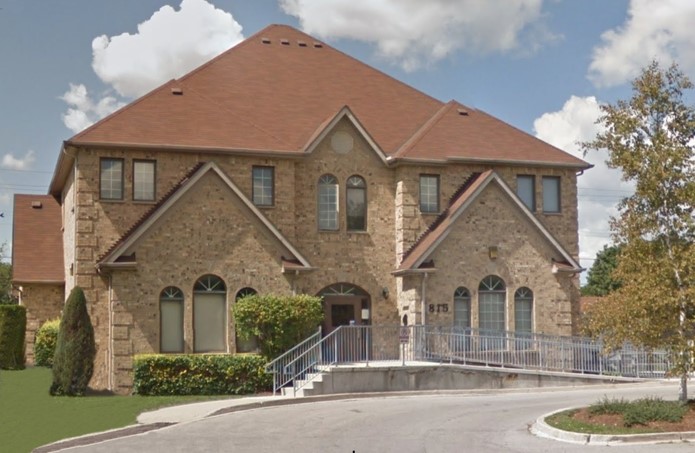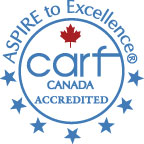The Dale Centre
OUR HISTORY
In 1980 the members of the Church at Westmount (now the AGAPE Foundation) saw the need for community based services for adults living with the effects of an acquired brain injury.
Funding was secured from the Ontario Government in 1984 and a site was provided by the members of the Church at Westmount. One of the first such programs in the province, this site became a transitional living centre called The Dale Home, named after the owners of the site.
From its grassroots inception, The Dale Home was a leader in innovative approaches to service delivery.
By 1990, the services provided by The Dale Home had outgrown the farmhouse. Through a major donation by the AGAPE Foundation The Dale Home Board members and staff designed and built The Dale Centre, still located at 815 Shelborne Street in London. Operational funding from the Ontario Ministry of Health enabled Dale to continue to provide, enhance and expand their services to acquired brain injury survivors. As a result of the expansion, and move from the farmhouse the organization was renamed Dale Head Injury Services.
By 1996 developments in the field of acquired brain injury and current terminology led to a decision to change the name to Dale Brain Injury Services (DBIS). As well in the mid 1990’s the Ontario government determined that it needed to create community based rehabilitation services as most individuals surviving severe brain injuries were still travelling to various US states for their rehab. DBIS was successful in receiving funding to become one of the 8 community based agencies for ABI rehab in the province and received many clients who were repatriated from US rehab facilities, some of whom remain with us today.
1999 opened the first internationally accredited Brain Injury Clubhouse. Cornerstone Clubhouse, which still has some founding members attending today. It merged with the Gateway to Connections program to form Group Services, now held at the Nigel and Rhonda Gilby Centre for New Tomorrows (CNT) on Saskatoon Street in London ON.
2002 began a Supported Independent Living Program (Outreach) in Sarnia.
2004-5 large expansion of Assisted Living (Residential) program with funding received to admit many individuals from all across the province.
2005 we introduced our Clinical Consultation and Training Team to assist our healthcare system partners across the Southwest region to build capacity across various domains of supporting individuals with brain injury and/or in the area of behaviour management.
In 2009 DBIS was very fortunate to have formed a partnership with Homes Unlimited to occupy the 2nd floor of their newly constructed Canada-Ontario Affordable Housing Project, Nelson Place. This new residence gave some participants the opportunity of having their own apartments. Subsequently we also have leased apartments from Homes Unlimited at the Burwell site.
2010 brought yet another partnering opportunity for us. In conjunction with SDI Builders, DBIS redeveloped 164 Albert Street into a 20 unit apartment building for individuals requiring affordable housing, and support services on an Outreach basis. Renovation costs were supported by the Canada-Ontario Affordable Housing Program. We are grateful to the City of London for approving our partnership with SDI for this project.
2010 with enhanced Outreach funding, we also expanded services to the ‘north’, Huron, Perth, Grey and Bruce counties, an area which previously had no services at all for people with ABI as well as further into the counties of Oxford, Elgin, and outside of London in Middlesex county.
2012 we began to refocus on person-centred approaches including experience based design, to ensure that we had co-design approaches for all that we do.
In 2012 we formally introduced respite services to enable families/caregivers to have some time away from their loved ones to have a vacation and look after themselves, knowing they are safe and well cared for by our staff team.
In 2013 Justice Case Management services began with a realignment of resources, in response to a significant need that was recognized by our partners in the health and justice systems to support persons with ABI as they make their way through the courts, probation and detention centre.
2014 funding for our Gateway to Connections Day Program for clients with more complex needs began at the Earl’s Court Long Term Care home.
2014 also saw achievement of our first CARF 3 year accreditation awarded (previously accredited through Accreditation Canada)
In 2018 we received funding for new Residential Transitional beds, located at our Burwell site. This is also the year we moved our head office into the Nigel and Rhonda Gilby Centre for New Tomorrows (CNT) on Saskatoon Street, combining our Gateway to Connections Day Program with the Cornerstone Clubhouse Day Program into Group Services – all at one location.
In 2019 we began the specialized Life After Stroke (LAS) Adult Day Program at the Nigel and Rhonda Gilby CNT with funding from the South West Local Health Integration Network.
We recently learned of new funds we will receive this year (2019) to begin a new intensive In Home Residential Transitional Program. More news on that to come!
We have progressed through many changes since those early days and we are committed to continued growth in the future. What has remained constant, and will not change, is our commitment to our clients and our role in helping them to build their futures.





